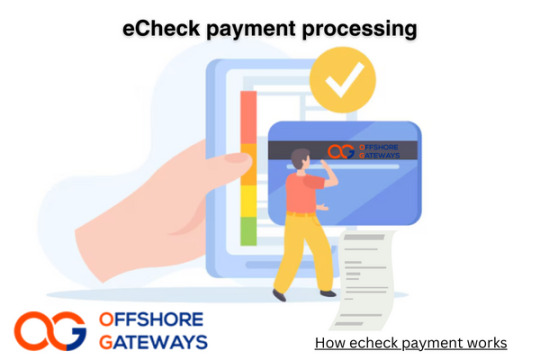#eCheck payment processing
Explore tagged Tumblr posts
Text

#Echeck#Electronic Check#Merchant Services#Payment Processing#Merchant Account#Payment Processing Companies#Payment gateway providers#Best Merchant Services#High Risk Merchant Account#Echeck Account#Echeck Payment Processor#Echeck Payment#Echeck Payment Processing#Electronic Check Payment#what is an echeck#Check 21#echeck casino#e commerce payment processing
3 notes
·
View notes
Text

How I Choosing the Right eCheck Payment Processor for our Business? Choosing the right "eCheck payment processor for your business" involves careful consideration of several key factors to ensure smooth transactions and optimal service
#Offshoregateways#High Risk payment gateway iptve#eCheck processing#Best echeck processor#eCheck payment processing#eCheck payment gateway#eCheck merchant account#High risk eCheck processing#ach eCheck processing#eCheck merchant services#Bulk eCheck Processing#High-Volume ACH Payments#Mass Payment Solutions#eCheck Batch Processing#High-Volume Payment Gateway#ACH Bulk Transfers#Enterprise eCheck Solutions
0 notes
Text
my mortgage got sold to a scummy debt collection agency before i was able to even make my first payment, it's so fucking annoying
i had to block their number bc they kept calling me, like no bitch you will never catch me answering the phone ever. communication will only take place over the mail, perhaps a secure website depending on what services they're using.
i'm glad to be paying a mortgage instead of rent, because at least the money is actually going towards something, but it hurts to give money directly to these companies -_-
#personal#i need to see what their online payment process is#bc i'm not making a fucking account on some random site#like ideally i can just do an echeck
1 note
·
View note
Text
#Echeck#Electronic Check#Merchant Services#Payment Processing#Merchant Account#Payment Processing Companies#Payment gateway providers#Best Merchant Services#High Risk Merchant Account#Echeck Account
1 note
·
View note
Text
Easy Invoice Payments Management
0 notes
Text
Understanding eChecks: The Digital Evolution of Traditional Checks
In today’s fast-paced digital world, electronic payments have become the norm for businesses and consumers alike. Among the various options available, eChecks—short for Echecks checks—stand out as a modern and secure alternative to traditional paper checks. Combining the familiarity of a check with the speed and convenience of online transactions, eChecks are transforming how money is transferred in both personal and professional settings.
What is an eCheck?
An eCheck is a form of payment that uses the Automated Clearing House (ACH) network to electronically debit funds from the payer’s checking account and deposit them into the payee’s bank account. Though it replicates the process of writing and depositing a paper check, it eliminates the need for physical paperwork, making transactions faster, more secure, and environmentally friendly.
How Does an eCheck Work?
The process begins when a customer authorizes a business or individual to withdraw a specific amount of money from their bank account. This authorization can be given online, over the phone, or through a signed agreement. Once authorized, the payment processor initiates the transaction through the ACH network. The funds typically transfer within 3–5 business days, though expedited options are available.
Benefits of eChecks
Cost-Effective: Compared to credit card transactions, eChecks come with lower processing fees, which can significantly reduce payment expenses for businesses.
Security: eChecks are encrypted and regulated under strict federal laws, reducing the risk of fraud and theft compared to paper checks that can be lost or forged.
Convenience: Payments can be made or received from anywhere with internet access. There’s no need to print, sign, or mail checks.
Speed: While not as instant as some digital wallets, eChecks still process faster than mailing physical checks and waiting for them to clear.
Environmentally Friendly: Going paperless reduces environmental waste and supports green business practices.
Common Uses of eChecks
eChecks are widely used in various industries, including real estate (for rent or mortgage payments), insurance (for policy premiums), education (for tuition payments), and service industries (for client billing). They are also a popular choice for recurring payments due to their reliability and low cost.
Are eChecks Safe?
Yes. eChecks are governed by the Echecks Fund Transfer Act (EFTA) and the National Automated Clearing House Association (NACHA) regulations. These rules ensure that all parties involved follow strict guidelines for authorization, processing, and record-keeping. Additionally, encryption and authentication technologies further protect the data involved in each transaction.
Conclusion
As businesses and consumers continue to embrace digital solutions, eChecks offer a practical, secure, and cost-effective way to send and receive payments. With benefits like lower fees, increased efficiency, and enhanced security, they are a smart alternative to both traditional checks and expensive card-based transactions. Whether you’re a small business owner or just someone looking for a convenient way to pay bills, eChecks are worth considering in the digital age.
0 notes
Text
Say Hello to Smarter Payments with eCheckplan!
If you're a business owner still stuck in the world of sky-high credit card fees and slow payments... It’s time for an upgrade. 🚀
Meet eCheckplan — the modern way to move money, built for businesses that want to save more, earn faster, and stress less.
🧠 What's an eCheck Anyway?
Imagine the old-school paper check... ✅ Now make it 100% digital. ✅ Add bank-level security. ✅ Speed it up to lightning-fast processing.
That’s an eCheck — a safer, faster, and way more affordable payment option that businesses (and customers) love.
🔥 Why Thousands Are Switching to eCheckplan
🔹 Save BIG on Fees Why lose 3–4% of every sale to credit cards? With eCheckplan, you keep more of what you earn — period.
🔹 Get Paid Faster No more waiting days for checks to clear. Our system moves your money quickly and securely.
🔹 Recurring Payments Made EASY Running a subscription business? eCheck payments are perfect for memberships, SaaS platforms, coaching programs, and more.
🔹 Rock-Solid Security We’re built on top-tier encryption, so every transaction is safe, verified, and protected.
🔹 Custom Solutions for YOUR Business From startups to enterprises — if you accept payments, we’ll tailor a solution just for you.
🌟 Real Talk: Why eChecks Just Make Sense
✅ Lower costs ✅ Happier customers ✅ Fewer chargebacks ✅ Simple online checkout ✅ Higher profits
(Seriously, why wouldn’t you want that?)
🚀 Ready to Future-Proof Your Business?
Ditch the heavy fees. Embrace smarter payments. Grow with eCheckplan — the partner your business deserves.
🌐 Discover More at eCheckplan.com
🔖 Save this post if you're ready to level up your payments!
#eCheckplan#SmartPayments#BusinessGrowth#EntrepreneurLife#eCheckPayments#PaymentProcessing#SaveMoney#FinancialFreedom#SmallBusinessTips
0 notes
Text
E-check
Electronic transactions are becoming commonplace for both consumers and organizations in the current digital era. The e-check, or electronic check, is one such digital payment mechanism that has become very popular. This article explores e-checks' definition, operation, advantages, and comparison to conventional checks.
An electronic check, or e-check, is a digital variant of a conventional paper check. It enables customers to transfer money straight from their bank accounts to make electronic payments. The Automated Clearing House (ACH) network processes e-checks, guaranteeing safe and effective transactions.
Advantages
The payer gives clear consent for the transaction, which can be acquired via signed contracts, online forms, or phone recordings. The payer provides the required banking information, such as account numbers and bank routing information. By sending the payment information to the ACH network, the payee's bank starts the transaction. The payment is processed by the ACH network, which moves money from the payer's account to the payee.
eChecks are a cost-effective choice for businesses because they frequently have lower processing fees than credit card transactions. Improved security measures, like authentication procedures and encryption, aid in preventing fraud and illegal transactions. By doing away with paper records and postal fees, electronic checks simplify the payment process for both payers and payees.
The same details as a paper check are included in an electronic check (eCheck), including the payment amount, bank routing number, and checking account number. The Automated Clearing House (ACH) network powers eChecks in the US. Under the direction of the Federal Reserve, the National Automated Clearing House Association (NACHA), a non-profit electronic network, oversees ACH payments.
E-checks are anticipated to advance in sophistication with improved security features and quicker processing times as technology develops further. Businesses and customers will gain from improved financial transaction efficiency and dependability if they use this digital payment mechanism. The future of payments is being shaped by e-checks, which provide a safe and affordable substitute for conventional techniques. They will be very important in the world of digital payments if they keep innovating.
Like a physical check, an electronic check documents a money transfer from one bank account to another. However, the process is significantly more efficient than it would be with a paper check because everything is done electronically. The electronic check, or e-check, has become a dependable, affordable, and secure substitute for conventional paper checks at a time when digital payment solutions are radically changing how companies and consumers conduct transactions. E-checks are a common choice for individuals, companies, and organizations because they leverage technology to bring together the ease of digital banking and the familiarity of checks. E-checks are marketed as a flexible and safe payment alternative since businesses and consumers continue to place a high value on digital solutions.

0 notes
Text
eCheck Payment Processing
QuadraPay provides secure and effective eCheck payment processing solutions for companies looking for a replacement for conventional credit card payments. With minimal transaction fees and increased fraud protection, eCheck processing is perfect for high-volume companies. Our platform provides smooth integration, quick payments, and trustworthy service, making it an easy option for companies requiring dependable, affordable payment processing.
0 notes
Text
0 notes
Text

#Echeck#Electronic Check#Merchant Services#Payment Processing#Merchant Account#Payment Processing Companies#Payment gateway providers#Best Merchant Services#High Risk Merchant Account#Echeck Account#Echeck Payment Processor#Echeck Payment#Echeck Payment Processing#Electronic Check Payment#what is an echeck#Check 21#echeck casino#e commerce payment processing
4 notes
·
View notes
Text
How eCheck payment Processing works with Guide?
"Electronic check (eCheck) payment processing" is a method of transferring funds electronically from one bank account to another, using the Automated Clearing House (ACH) network. Here's a "step-by-step guide on how eCheck payment processing" typically works:

Authorization: The payer (customer) initiates an eCheck payment either online or through a point-of-sale system by providing their bank account details (account number and routing number), along with the payment amount and any other required information.
Verification: The provided bank account information is verified for accuracy and validity. This can involve validating the routing number to ensure it corresponds to a legitimate financial institution and checking the account number format.
Authorization and Consent: The payer authorizes the transaction by agreeing to the terms and conditions set by the payee (merchant or service provider). This authorization may be in the form of an electronic signature or a checkbox indicating consent.
Initiation of Transaction: The payee submits the eCheck transaction details, including the payer's bank account information and the payment amount, to their payment processor or bank.
Transmission to ACH Network: The payment processor or bank forwards the transaction details to the ACH network, which acts as a central clearinghouse for electronic payments in the United States.
Clearing and Settlement: The ACH network processes the eCheck transaction by debiting the payer's bank account and crediting the payee's bank account. This process typically takes 1-2 business days to complete.
Notification of Transaction Status: Both the payer and the payee receive notifications of the transaction status. This may include confirmation of successful payment or notification of any issues, such as insufficient funds or account discrepancies.
Funds Availability: Once the transaction has cleared and settled, the payee can access the funds in their bank account. The availability of funds may vary depending on the policies of the payee's bank.
Record Keeping: Both the payer and the payee maintain records of the eCheck transaction for accounting and reconciliation purposes. This includes details such as transaction date, amount, payer information, and payment reference.
Security Measures: Throughout the eCheck payment process, various security measures are in place to protect sensitive information and prevent fraudulent activity. These measures may include encryption of data, multi-factor authentication, and fraud detection algorithms.
Overall, eCheck payment processing offers a convenient and cost-effective way for businesses to accept payments electronically while providing customers with a familiar and secure payment option.
#High Risk payment gateway iptv#eCheck processing#Best echeck processor#eCheck payment processing#eCheck payment gateway#eCheck merchant account#High risk eCheck processing#ach eCheck processing#eCheck merchant services#Bulk eCheck Processing#High-Volume ACH Payments#Mass Payment Solutions#eCheck Batch Processing#High-Volume Payment Gateway#ACH Bulk Transfers#Enterprise eCheck Solutions
0 notes
Link
0 notes
Text
0 notes
Text
0 notes